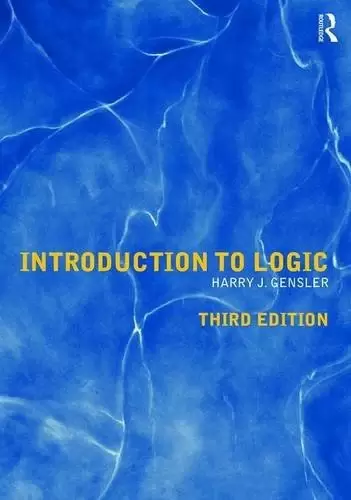
作者:HarryJ.Gensler
出版社:Routledge
出版年:2016-12-22
页数:428
定价:USD54.95
装帧:Paperback
ISBN:9781138910591
内容简介
······
Introduction to Logic is clear and concise, uses interesting examples (many
philosophical in nature), and has easy-to-use proof methods. Its key features,
retained in this Third Edition, include:
• simpler ways to test arguments, including an innovative proof method and the
star test for syllogisms;
• a wide scope of materials, suiting it for introductory or intermediate courses;
• engaging examples, from philosophy and everyday life;
• useful for self-study and preparation for standardized tests, like the LSAT;
• a reasonable price (a third the cost of some competitors); and
• exercises that correspond to the free LogiCola instructional program.
This Third Edition:
• improves explanations, especially on areas that students find difficult;
• has a fuller explanation of traditional Copi proofs and of truth trees; and
• updates the companion LogiCola software, which now is touch friendly (for
use on Windows tablets and touch monitors), installs more easily on Windows
and Macintosh, and adds exercises on Copi proofs and on truth trees. You can
still install LogiCola for free (from http://www.harryhiker.com/lc or http://www.routledge.com/cw/gensler)
作者简介
······
Harry J. Gensler, S.J., is Professor of Philosophy at Loyola University Chicago.
His fourteen earlier books include Gödel’s Theorem Simplified (1984), Formal Ethics (1996), Catholic Philosophy Anthology (2005), Historical Dictionary of Logic (2006), Historical Dictionary of Ethics (2008), Ethics: A Contemporary Introduction (1998 & 2011), Ethics and the Golden Rule (2013), and Ethics and Religion (2016)
目录
······
Preface
1 Introduction
1.1 Logic
1.2 Valid arguments
1.3 Sound arguments
1.4 The plan of this book
2 Syllogistic Logic
2.1 Easier translations
2.2 The star test
2.3 English arguments
2.4 Harder translations
2.5 Deriving conclusions
2.6 Venn diagrams
2.7 Idiomatic arguments
2.8 The Aristotelian view
3 Meaning and Definitions
3.1 Uses of language
3.2 Lexical definitions
3.3 Stipulative definitions
3.4 Explaining meaning
3.5 Making distinctions
3.6 Analytic and synthetic
3.7 A priori and a posteriori
4 Fallacies and Argumentation
4.1 Good arguments
4.2 Informal fallacies
4.3 Inconsistency
4.4 Constructing arguments
4.5 Analyzing arguments
5 Inductive Reasoning
5.1 The statistical syllogism
5.2 Probability calculations
5.3 Philosophical questions
5.4 Reasoning from a sample
5.5 Analogical reasoning
5.6 Analogy and other minds
5.7 Mill’s methods
5.8 Scientific laws
5.9 Best-explanation reasoning
5.10 Problems with induction
6 Basic Propositional Logic
6.1 Easier translations
6.2 Basic truth tables
6.3 Truth evaluations
6.4 Unknown evaluations
6.5 Complex truth tables
6.6 The truth-table test
6.7 The truth-assignment test
6.8 Harder translations
6.9 Idiomatic arguments
6.10 S-rules
6.11 I-rules
6.12 Mixing S- and I-rules
6.13 Extended inferences
6.14 Logic and computers
7 Propositional Proofs
7.1 Easier proofs
7.2 Easier refutations
7.3 Harder proofs
7.4 Harder refutations
7.5 Copi proofs
7.6 Truth trees
8 Basic Quantificational Logic
8.1 Easier translations
8.2 Easier proofs
8.3 Easier refutations
8.4 Harder translations
8.5 Harder proofs
8.6 Copi proofs
9 Relations and Identity
9.1 Identity translations
9.2 Identity proofs
9.3 Easier relations
9.4 Harder relations
9.5 Relational proofs
9.6 Definite descriptions
9.7 Copi proofs
10 Basic Modal Logic
10.1 Translations
10.2 Proofs
10.3 Refutations
11 Further Modal Systems
11.1 Galactic travel
11.2 Quantified translations
11.3 Quantified proofs
11.4 A sophisticated system
12 Deontic and Imperative Logic
12.1 Imperative translations
12.2 Imperative proofs
12.3 Deontic translations
12.4 Deontic proofs
13 Belief Logic
13.1 Belief translations
13.2 Belief proofs
13.3 Believing and willing
13.4 Willing proofs
13.5 Rationality translations
13.6 Rationality proofs
13.7 A sophisticated system
14 A Formalized Ethical Theory
14.1 Practical reason
14.2 Consistency
14.3 The golden rule
14.4 Starting the GR proof
14.5 GR logical machinery
14.6 The symbolic GR proof
15 Metalogic
15.1 Metalogical questions
15.2 Symbols
15.3 Soundness
15.4 Completeness
15.5 An axiomatic system
15.6 Gödel’s theorem
16 History of Logic
16.1 Ancient logic
16.2 Medieval logic
16.3 Enlightenment logic
16.4 Frege and Russell
16.5 After Principia
17 Deviant Logics
17.1 Many-valued logic
17.2 Paraconsistent logic
17.3 Intuitionist logic
17.4 Relevance logic
18 Philosophy of Logic
18.1 Abstract entities
18.2 Metaphysical structures
18.3 The basis for logical laws
18.4 Truth and paradoxes
18.5 Logic’s scope
For Further Reading
Answers to Selected Problems
Index
评论 ······
逻辑学教材
这本书给了我一种我也能阅读英文书的错觉,后半部分讲道义逻辑的可以算是作者的私货了,不过也至少能够让人知道如何应用现代逻辑来讨论哲学问题。
放弃了,还是批判性思维这样的书比较适合我。这个有种数学的感觉,数学不好的我流下泪水。
一边理解英语一边思考逻辑问题,还能给我一条生路吗?
看得我好累,终于第一遍完事了……下学期加油……
评论前必须登录!
注册